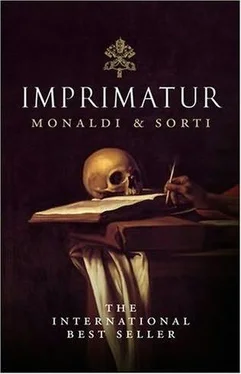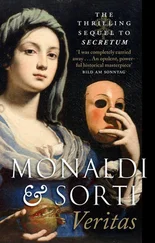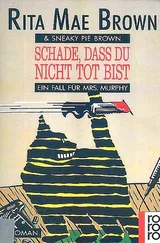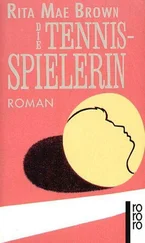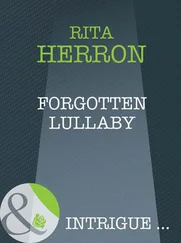Rita Monaldi - Imprimatur
Здесь есть возможность читать онлайн «Rita Monaldi - Imprimatur» весь текст электронной книги совершенно бесплатно (целиком полную версию без сокращений). В некоторых случаях можно слушать аудио, скачать через торрент в формате fb2 и присутствует краткое содержание. Жанр: Исторический детектив, на английском языке. Описание произведения, (предисловие) а так же отзывы посетителей доступны на портале библиотеки ЛибКат.
- Название:Imprimatur
- Автор:
- Жанр:
- Год:неизвестен
- ISBN:нет данных
- Рейтинг книги:5 / 5. Голосов: 1
-
Избранное:Добавить в избранное
- Отзывы:
-
Ваша оценка:
- 100
- 1
- 2
- 3
- 4
- 5
Imprimatur: краткое содержание, описание и аннотация
Предлагаем к чтению аннотацию, описание, краткое содержание или предисловие (зависит от того, что написал сам автор книги «Imprimatur»). Если вы не нашли необходимую информацию о книге — напишите в комментариях, мы постараемся отыскать её.
Imprimatur — читать онлайн бесплатно полную книгу (весь текст) целиком
Ниже представлен текст книги, разбитый по страницам. Система сохранения места последней прочитанной страницы, позволяет с удобством читать онлайн бесплатно книгу «Imprimatur», без необходимости каждый раз заново искать на чём Вы остановились. Поставьте закладку, и сможете в любой момент перейти на страницу, на которой закончили чтение.
Интервал:
Закладка:
At the time I did not, alas, follow attentively what the couple told me about the progress of their work. Meanwhile-spurred on by the birth of a beautiful little girl, and tired of building on the quicksands of our poor country-at the beginning of the new century, the couple suddenly decided to move to Vienna, a city to which they had grown attached, perhaps also because it held fond memories for them of their first days as man and wife.
They invited me for a brief leave-taking shortly before their departure from Rome. They promised to write to me and to call on me whenever they visited Italy.
They did none of those things, nor did I ever hear from them again. Until, one day, months later, I received a parcel from Vienna. It contained the typescript which I am now sending you: it was the long-awaited novel.
I was happy to know that they had at least succeeded in completing it and wanted to reply and thank them. But I was surprised to find that they had not sent me their address, nor was there any covering message. As a frontispiece, a meagre dedication: "To the defeated". And on the back of the folder, just a scribble with a felt-tipped pen: "Rita and Francesco".
So I read the novel. Or should I rather say: the memoirs? Are these really memoirs from the baroque period, reworked for today's readers? Or is it a modern novel set in the seventeenth century? Or both? These are questions that still beset me. There are indeed places where one seems to be reading pages that have come down to us intact from the seventeenth century: all the characters invariably use the vocabulary to be found in treatises of the period. But then, when discourse gives way to action, the linguistic register changes sharply, the same characters express themselves in modern prose and their doings seem even to take on the character of a detective novel- one of the Sherlock Holmes and Watson variety, to put it plainly. As though, in those passages, the authors had deliberately left traces of their intervention.
And what if they had lied to me? I was surprised to find myself wondering just that. What if the tale of the apprentice's manuscript which they had found was all an invention? Was it not too much like the device employed by both Manzoni and Dumas for the opening of their masterpieces, The Betrothed and The Three Musketeers'? Both of which, coincidentally, are set in the seventeenth century…
Unfortunately, I have not been able to get to the bottom of the matter, which is probably destined to remain a mystery. I have indeed been quite unable to trace the eight volumes of Abbot Melani's letters, from which the whole story began. The library of the Marchese ****** was Split up by his heirs and sold some ten years ago. After I had bothered a few acquaintances, the auctioneers who made the sale discreetly passed me the names of the buyers.
I thought I had found the solution and that the Lord was with me, until I read the names of the new owners: they were Rita and Francesco. And, of course, they had left no address.
During the course of the past three years I have, with the few resources at my disposal, conducted a painstaking series of checks on the contents of the typescript. You will find the outcome of my research in the pages which I have annexed at the end of the text.
These, I beg you to read most attentively. You will discover for how long I relegated to oblivion the work of my two friends, and the sufferings which that has caused me. You will also find a detailed examination of the historical events narrated in the typescript, and an account of the exhaustive research I conducted in the archives and libraries of half Europe, in order to understand whether these might correspond to the truth.
As you can judge for yourself, the impact of the facts narrated was indeed such as to alter the course of history violently, and forever.
Very well, having completed my research, I can affirm with certainty that the events and persons contained in the story which you are about to read are authentic. And, even where it was not possible to find the proofs of what I had read, I was at least able to establish the verisimilitude of the events recounted.
The affair narrated by my two former parishioners, while not gravitating only around Pope Innocent XI (who is indeed barely even a protagonist of the novel) does, however, bring to light circumstances which cast new and grave imputations as to the limpidity of the Pontiff's soul and the honesty of his words. I say new, insofar as the inquiry into the beatification of Pope Odescalchi, opened on 3rd September, 1714 by Pope Clement XI, encountered objections super virtutibus during the first preparatory stages, raised within the Congregation by the Promoter of the Faith. Thirty years were to pass before Pope Benedict XIV Lambertini silenced by decree all doubts expressed by the promoters and consultors as to the heroic virtues of Innocent XI. But, shortly afterwards, the process again came to a halt, this time for almost two hundred years: indeed, only in 1943, under Pope Pius XII, was another rapporteur appointed. The process of beatification took a further thirteen years, until 7th October, 1956. Ever since that day, Pope Odescalchi has remained shrouded in silence. Never again, until now, was there talk of proclaiming him a saint.
It would have been possible for me, by virtue of the legislation approved by Pope John Paul II over fifty years ago, to request further inquiries. But in that case, I would not have been abl e secretum servare in iis ex quorum revelatione preiudicium causae vel infamiam beato afferre posset. In other words, I would then have had to reveal the contents of Rita and Francesco's typescript, if only to the promoter of justice or to the postulator (the saints' prosecution and defence lawyers, as the press so crudely describes them).
In so doing, I would have permitted grave and irreversible aspersions to be cast on the virtue of the Blessed: a decision which could be taken only by the Supreme Pontiff, certainly not by myself.
If, however, the work had in the meantime been published, I would have been freed from the obligation to secrecy I therefore hoped that my two parishioners' book had already found a publisher. I confided the search to some of the youngest and least experienced members of my staff. But in the catalogues of books on sale, I found neither any writings of the kind nor my friends' names.
I tried to trace the two young people (by now surely no longer young): the registers showed that they had indeed moved to Vienna, at Auerspergstrasse 7. I wrote to that address but received a reply from the head of a university hostel, who was unable to provide me with any assistance. I asked the Commune of Vienna, but nothing useful came of that.
I feared the worst. I wrote to the parish priest of the Minoritenkirche, the Italian church in Vienna. But Rita and Francesco were unknown to everyone there, including, fortunately, the keeper of the graveyard records.
In the end, I decided to go to Vienna myself, in the hope of tracing at least their daughter, even though, some forty years after the event, I could no longer remember her Christian name. As was to be expected, this last attempt also came to nothing.
For three years, I have sought them everywhere. Sometimes I find myself looking at girls with red hair like Rita's, forgetting that hers will now be as white as my own. Today, she will be seventy-four and Francesco, seventy-six.
Now, I take my leave of you, and of His Holiness. May God inspire you in the reading which you are about to undertake.
Msgr Lorenzo Dell'Agio
Bishop of the Diocese of Como
To the defeated
Sir,
In conveying to you these memoirs which I have at last recover'd,
I dare hope that 'Your Excellency will recognise in my Efforts to comply with Your Wishes that Excess of Passion and of Love which has ever been the cause of my Felicity, whenever I have had Occasion to bear Witness thereof to your Excellency.
Читать дальшеИнтервал:
Закладка:
Похожие книги на «Imprimatur»
Представляем Вашему вниманию похожие книги на «Imprimatur» списком для выбора. Мы отобрали схожую по названию и смыслу литературу в надежде предоставить читателям больше вариантов отыскать новые, интересные, ещё непрочитанные произведения.
Обсуждение, отзывы о книге «Imprimatur» и просто собственные мнения читателей. Оставьте ваши комментарии, напишите, что Вы думаете о произведении, его смысле или главных героях. Укажите что конкретно понравилось, а что нет, и почему Вы так считаете.
